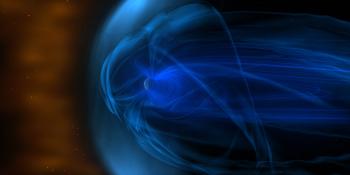Viewing archive of Monday, 27 June 2022
Daily bulletin on solar and geomagnetic activity from the SIDC
Issued: 2022 Jun 27 1231 UTC
SIDC Forecast
Solar flares
Quiet conditions (<50% probability of C-class flares)
Geomagnetism
Active conditions expected (A>=20 or K=4)
Solar protons
Quiet
| 10cm flux | Ap | |
|---|---|---|
| 27 Jun 2022 | 098 | 021 |
| 28 Jun 2022 | 100 | 012 |
| 29 Jun 2022 | 098 | 008 |
Bulletin
Solar flaring activity over the past 24 hours was at very low levels. Active region NOAA 3038 (beta) is now rotating behind the northwest limb. NOAA AR 3040 (beta) is currently crossing the central meridian, but has remained magnetically simple and inactive. The X-ray flaring activity over the next 24 hours is expected to remain at very levels with small chances for isolated C-class flaring.
The partial halo coronal mass ejection (CME) first observed in LASCO C2 data around 03:24 UTC on June 26th with an average plane of sky velocity of around 680 km/s is now attributed to an on disc filament eruption in the south-west quadrant. Based on the filament location and the direction of the CME, the bulk of the ejecta is expected to miss the Earth with a minor chance for a weak glancing blow arrival on June 29th. No other Earth- directed coronal mass ejections (CMEs) were detected in the available coronagraph imagery over the past 24 hours.
The greater than 10 MeV proton flux was at nominal levels in the past 24 hours and is expected to remain so in the next 24 hours. The greater than 2 MeV electron flux has crossed the 1000 pfu threshold and is expected to remain above the 1000 pfu threshold for long period of time over the next 24 hours. The 24h electron fluence was at nominal levels and is expected to increase to moderate levels over the next 24 hours.
Over the past 24 hours the solar wind parameters (ACE and DSCOVR) remained under the influence of the high speed stream (HSS), which was reported yesterday. The solar wind velocity has decreased from over 700 km/s to about 500 km/s at present. The interplanetary magnetic field also decreased from 9.7 nT to 6 nT at present. The Bz component was weak and mostly positive. The B field was predominantly in the negative sector (directed towards the Sun). The solar wind parameters are expected to remain enhanced over the next 24 hours under the influence of the HSS.
The geomagnetic conditions over the past 24 hours were unsettled to active. Quiet to active geomagnetic conditions are expected over the next 24 hours as the Earth remains under the influence of the high speed stream.
Today's estimated international sunspot number (ISN): 057, based on 17 stations.Solar indices for 26 Jun 2022
| Wolf number Catania | /// |
| 10cm solar flux | 102 |
| AK Chambon La Forêt | 034 |
| AK Wingst | 027 |
| Estimated Ap | 029 |
| Estimated international sunspot number | 034 - Based on 23 stations |
Noticeable events summary
| Day | Begin | Max | End | Loc | Strength | OP | 10cm | Catania/NOAA | Radio burst types | |
|---|---|---|---|---|---|---|---|---|---|---|
| None | ||||||||||
Provided by the Solar Influences Data analysis Center© - SIDC - Processed by SpaceWeatherLive
All times in UTC
Latest news
Latest forum messages
Support SpaceWeatherLive.com!
A lot of people come to SpaceWeatherLive to follow the Sun's activity or if there is aurora to be seen, but with more traffic comes higher server costs. Consider a donation if you enjoy SpaceWeatherLive so we can keep the website online!

Space weather facts
| Last X-flare | 2025/03/28 | X1.1 |
| Last M-flare | 2025/04/22 | M1.3 |
| Last geomagnetic storm | 2025/04/21 | Kp5+ (G1) |
| Spotless days | |
|---|---|
| Last spotless day | 2022/06/08 |
| Monthly mean Sunspot Number | |
|---|---|
| March 2025 | 134.2 -20.4 |
| April 2025 | 126.5 -7.7 |
| Last 30 days | 124.6 -4.5 |


